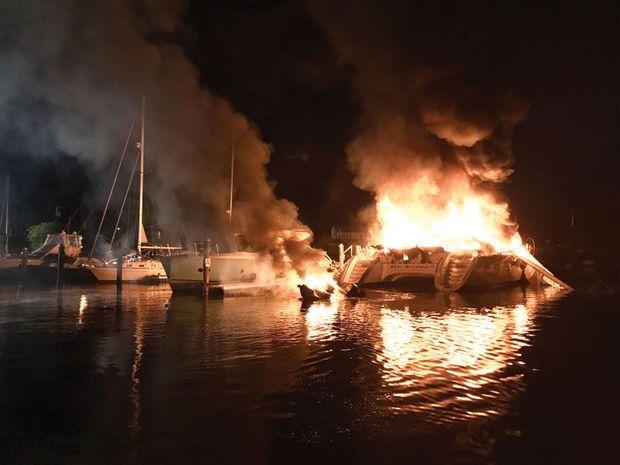Chris Sullivan, a liveaboard powerboater formerly from Annapolis, moved to Falmouth, MA, a few years back to live and work in a marina. Here is his story of recently experiencing a slip mate’s boat fire:

Being awoken from a deep slumber by someone banging on the side of your hull at 1:30 a.m. is not anyones choice of how they would want to wake up. Yet there I was in the early morning hours of July 11 waking to just that and wondering if it was just a dream. What I came out of my cabin to see I hope no boater has to ever witness: a neighboring boat starting to go up in flames and a crew member attempting to put out the flames with a garden hose.
Below is a quick take on my thoughts on what I did in this situation, along with a few things in hindsight I should have done, and things I will do moving forward.
Things that were done right
- Checked with the boat crew to make sure everyone was off the boat—I got all the important info: was everyone off, how many where there, and do they know what caused the fire?
- Called 911—know your marina’s address. All your boat friends know where your marina is, but the dispatcher normally doesn’t have a clue. Be sure to let them know everyone is accounted for if that’s the case; don’t have them spending extra time and risk looking for a person.
- Had my boat ready for sea—I have always prided myself on having my boat ready to leave the dock in less than five minutes; this was clutch that morning.
- Evacuated my dog to my truck for safety.
- Grabbed important personal items (passport/license/remote hard drives) to stash in my truck—This should take less than 10 seconds.
- Got the boat out of the slip to another location in the marina upwind from the fire
- Made sure once my boat was secure, to go to the fire department on scene and pass along any additional info I had on neighboring boats and possible people onboard.
Things to change
- While taking off from the slip it took way too long to undo all the lines. Liveaboards sometimes tie the boat up for a weather event that has come and gone and not removed the lines once the weather event passes. I was guilty of this, and the additional three lines took time that I didn’t really have.
- Better / bigger hooks on the pilings to hold the lines: While leaving the slip, lines were thrown onto the pilings but missed, which meant I had four lines in the water... I had to pull out very slowly bumping in and out of gear to make sure the lines didn’t get wrapped in my propeller, again slowing things down.
- A large knife—thankfully I avoided sucking in a line, but if I had, I had no quick means of cutting the line free; the boat and I would have ended up possibly in a worse position. In the future I will keep a large knife for line cutting readily available at the helm.
- Although I called 911 and fire and EMS arrived, they did not alert the USCG until much later. While moving my boat to its new slip I should have called the USCG on the VHF to ensure they were aware. They may or not be able to assist.
 Being awoken from a deep slumber by someone banging on the side of your hull at 1:30 a.m. is not anyones choice of how they would want to wake up. Yet there I was in the early morning hours of July 11 waking to just that and wondering if it was just a dream. What I came out of my cabin to see I hope no boater has to ever witness: a neighboring boat starting to go up in flames and a crew member attempting to put out the flames with a garden hose.
Below is a quick take on my thoughts on what I did in this situation, along with a few things in hindsight I should have done, and things I will do moving forward.
Being awoken from a deep slumber by someone banging on the side of your hull at 1:30 a.m. is not anyones choice of how they would want to wake up. Yet there I was in the early morning hours of July 11 waking to just that and wondering if it was just a dream. What I came out of my cabin to see I hope no boater has to ever witness: a neighboring boat starting to go up in flames and a crew member attempting to put out the flames with a garden hose.
Below is a quick take on my thoughts on what I did in this situation, along with a few things in hindsight I should have done, and things I will do moving forward.